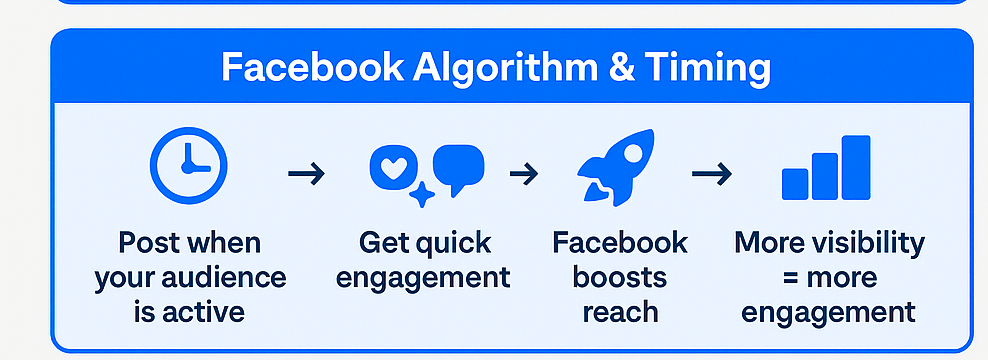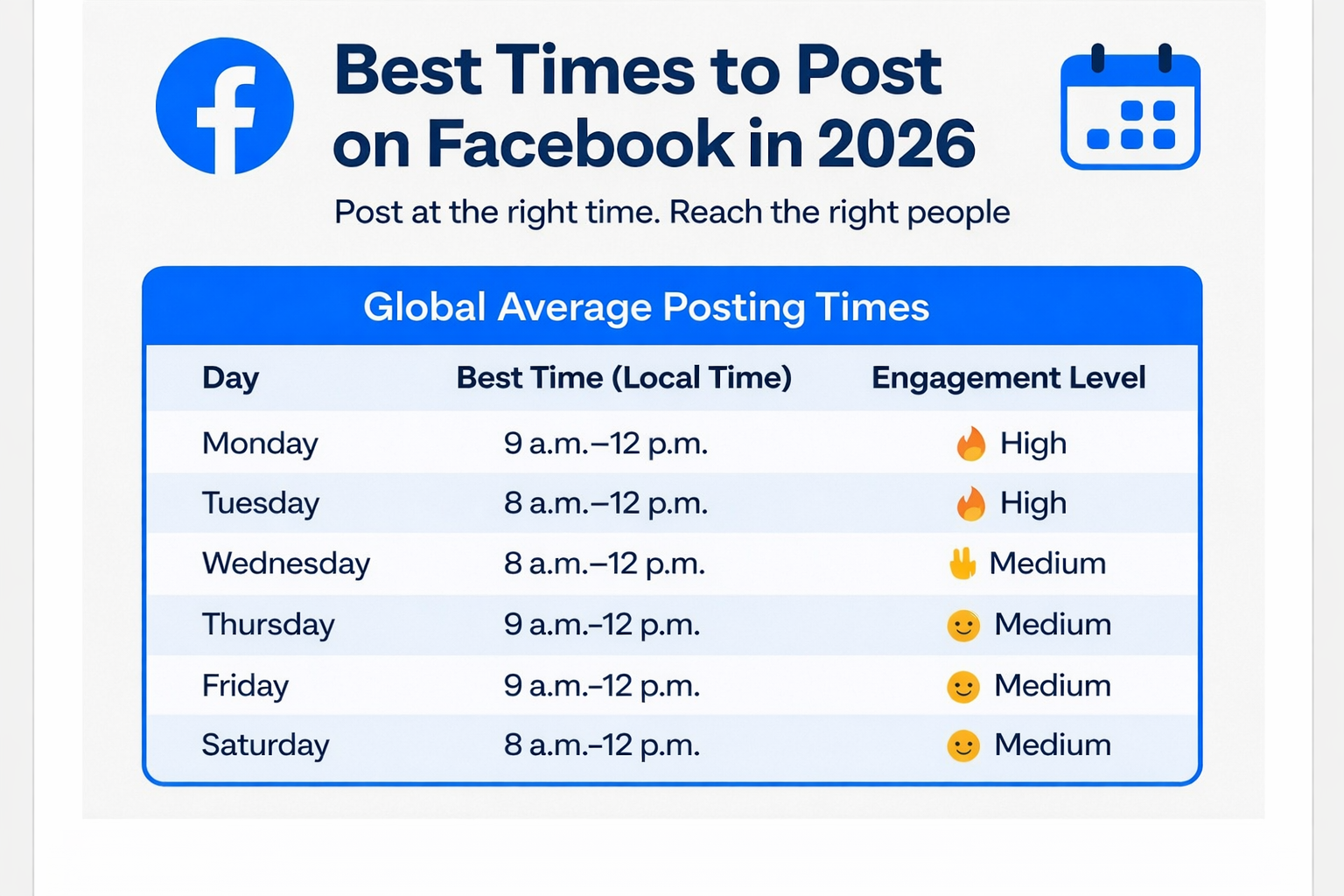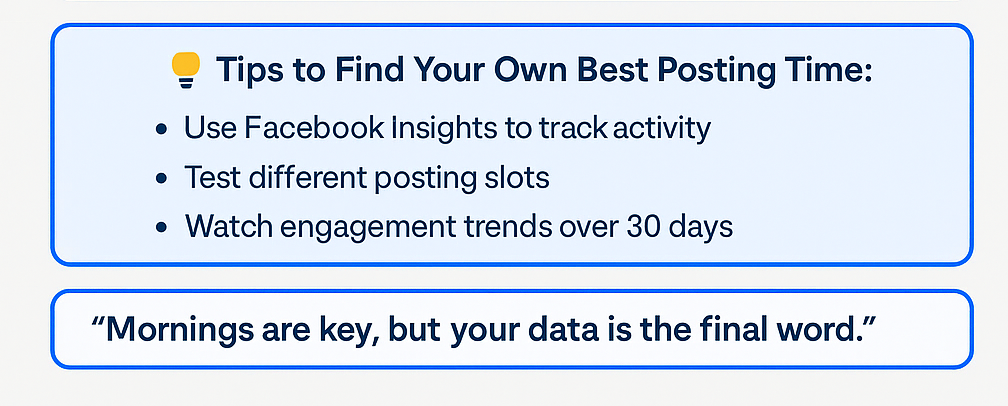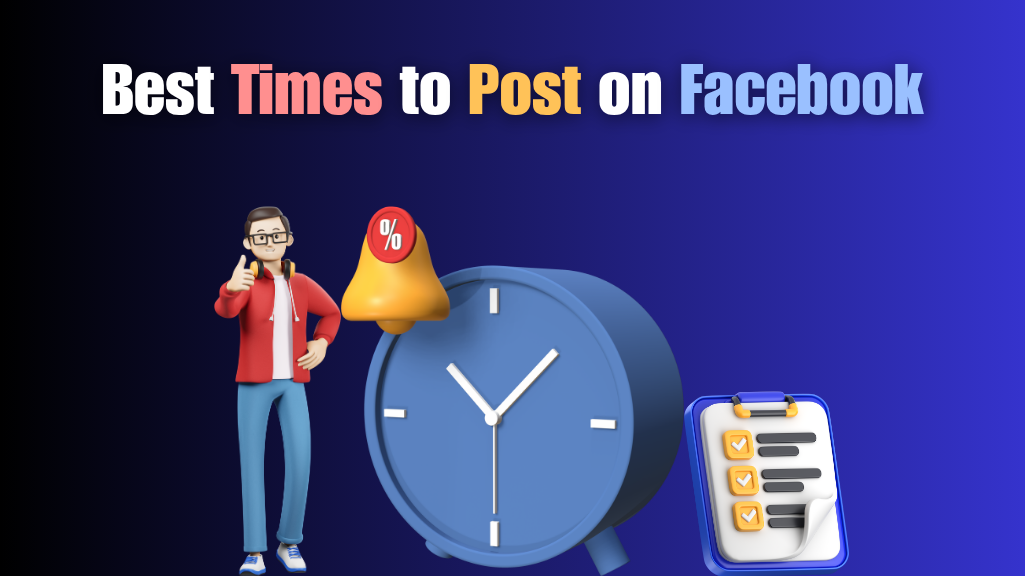Are you posting on Facebook but not getting the likes, comments, or shares you expected?
You might be posting at the wrong time. In 2026, Facebook is more competitive than ever, and the timing of your posts can make a big difference in how many people see and engage with them. Posting when your audience is most active increases your chances of reaching more people, getting more interaction, and making your content stand out in the busy Facebook feed.
Is There a Best Time to Post on Facebook?
There’s no single “magic hour” on Facebook that will guarantee your post goes viral — if only it were that easy. The truth is, the best posting time always depends on your audience and when they’re most active.
However, research and data have shown clear patterns between certain posting times and higher engagement rates. These insights can give you a solid starting point, especially if you’re new to Facebook marketing.
Think of these suggested times as a guide, not a rule. Use them to experiment, track your results, and see what works best for your specific audience. The good news? Facebook offers plenty of high-engagement time slots you can test as part of your digital marketing strategy.
Why Posting Time Matters on Facebook in 2026
In 2026, Facebook’s feed is more crowded than ever, with millions of posts competing for attention every hour. Even if you create high-quality content, posting it at the wrong time can mean fewer people see it. Facebook’s algorithm prioritizes content that gets quick engagement, so the sooner people react, comment, or share after you post, the more reach your content is likely to get.
When you post at the right time — the moments when your audience is most active — you give your content the best chance to appear higher in their feeds. This can lead to:
- More likes, comments, and shares
- Higher visibility without spending more on ads
- Stronger audience relationships over time
- Better results from your overall marketing strategy
In short, timing your posts right is like giving your content a head start in the race for attention on Facebook. The more you align with your audience’s habits, the better your chances of standing out.
How Facebook’s Algorithm Affects Post Timing
Facebook’s algorithm decides which posts show up in a user’s feed and in what order. It doesn’t just show content in the order it’s posted — instead, it ranks posts based on how relevant and engaging they are likely to be for each person.
One important factor is recency. Facebook tends to prioritize fresh content, especially if it gets quick engagement soon after being posted. This means timing plays a big role in how many people actually see your post.
Here’s how the algorithm and timing work together:
- Post when your audience is online – If your followers see your post right after it’s published, they’re more likely to engage with it.
- Early engagement boosts reach – When people like, comment, or share soon after you post, Facebook sees it as valuable content and shows it to more people.
- Active hours matter – Posting during times of low activity might bury your content under newer posts by the time your audience logs in.
- Content type can influence timing – Video, live streams, and interactive posts can perform differently depending on when they’re posted.
In short, the Facebook algorithm rewards content that is fresh, relevant, and quickly engaged with. Posting at the right time helps you meet those conditions, which can improve reach without increasing ad spend.

Best Times to Post on Facebook in 2026 (Global Averages)
If you’re looking for a starting point before testing your own audience data, global engagement trends can be a helpful guide. Research from millions of Facebook posts shows that mornings are consistently the most active time for users worldwide.
In 2026, the highest engagement times globally fall between 8 a.m. and 12 p.m., with a few exceptions in the mid-afternoon on certain days. This pattern suggests that users often check Facebook early in the day — whether during their commute, morning coffee, or first work break.
Global Peak Posting Times
- Monday: 9 a.m.–12 p.m.
- Tuesday: 8 a.m.–12 p.m.
- Wednesday: 8–11 a.m. and 3–5 p.m.
- Thursday: 8 a.m.–12 p.m.
- Friday: 9–10 a.m.
- Saturday: 9 a.m.
- Sunday: 8 a.m.–12 p.m.
Best Days to Post: Monday to Friday
Lowest Engagement Day: Sunday (after noon)
Posting within these windows increases your chance of appearing higher in your audience’s feed, but they should be used as guidelines, not fixed rules. Every audience is unique, so tracking your own data in Facebook Insights will give you the most accurate results for your brand.

Best Times to Post by Content Type
Best Times to Post Photos on Facebook
Photos usually get quick likes and comments, especially when posted at the start of the day. Posting between 8 a.m. and 11 a.m. works best for most pages because people check Facebook in the morning while commuting, during breakfast, or right before starting work. Bright, high-quality images with short captions tend to attract attention faster during these hours.
Best Times to Post Videos on Facebook
Videos, especially short clips, tend to perform well in the evening between 6 p.m. and 9 p.m. when users are more relaxed and have time to watch. For informational or business-related videos, try lunchtime slots from 12 p.m. to 1 p.m. when people take breaks. Always use captions, as many viewers watch videos with the sound off.
Best Times to Post Links on Facebook
Links to blog posts, articles, or products usually do better during mid-morning hours, around 9 a.m. to 11 a.m. This is when people are actively browsing and more likely to click through. Avoid late-night posting for links, as click-through rates tend to drop after 9 p.m.
Best Times to Post Stories and Reels
Stories and Reels are consumed quickly and disappear fast, so they work well during peak scrolling times — early morning (7 a.m. to 9 a.m.) and evening (6 p.m. to 8 p.m.). Posting at these times can help you stay at the top of your audience’s feed when they’re most active.
At-a-Glance: Content Type vs. Best Time
| Content Type | Best Times to Post |
|---|---|
| Photos | 8 a.m. – 11 a.m. |
| Videos | 6 p.m. – 9 p.m.12 p.m. – 1 p.m. |
| Links | 9 a.m. – 11 a.m. |
| Stories & Reels | 7 a.m. – 9 a.m.6 p.m. – 8 p.m. |
Best Times to Post by Industry
Best Times for E-commerce Businesses
For online stores, mornings are a golden opportunity to reach shoppers. Posting between 9 a.m. and 11 a.m. works well, as people often browse for deals and products before starting their day. Weekend mornings can also be effective, especially during holiday seasons or sales events when buying intent is higher.
Best Times for Service-Based Businesses
Businesses offering services like consulting, repair, or education tend to get better engagement midweek from 10 a.m. to 1 p.m. This is when potential clients are actively searching for solutions and have time to make inquiries. Avoid late evenings, as service-related content usually requires more decision-making and planning.
Best Times for Content Creators & Influencers
Influencers and creators benefit most from evening hours between 6 p.m. and 9 p.m., when audiences are relaxed and scrolling for entertainment. Posting just before these hours can help your content warm up in the algorithm, ensuring it’s visible during the peak viewing window.
Best Times for Nonprofits & Community Pages
Nonprofits and community organizations often see the highest interaction early in the morning (7 a.m. to 9 a.m.) and around lunchtime (12 p.m. to 1 p.m.). These times catch supporters before their day gets busy and during breaks, making it easier to encourage donations, shares, or event participation.
At-a-Glance: Industry vs. Best Time
| Industry | Best Times to Post |
|---|---|
| E-commerce Businesses | 9 a.m. – 11 a.m.Weekend mornings |
| Service-Based Businesses | 10 a.m. – 1 p.m. (midweek) |
| Content Creators & Influencers | 6 p.m. – 9 p.m. |
| Nonprofits & Community Pages | 7 a.m. – 9 a.m.12 p.m. – 1 p.m. |
Best Times to Post by Audience Location
Posting for a U.S.-based Audience
If your main audience is in the United States, aim to post between 8 a.m. and 11 a.m. (EST). These hours capture both early risers on the East Coast and mid-morning activity on the West Coast. For nationwide reach, consider scheduling posts slightly earlier to cover all time zones effectively.
Posting for a UK & Europe-based Audience
For audiences in the UK and Europe, 7 a.m. to 10 a.m. (GMT) works best. People often check Facebook during their morning commute or before starting work. If you’re targeting both UK and mainland Europe, align your schedule to overlap the morning hours across time zones.
Posting for an Asia-based Audience
In Asia, posting between 6 p.m. and 9 p.m. local time tends to get strong engagement. Many users in Asian countries browse Facebook after work or during dinner breaks, making evenings a prime time for visibility.
At-a-Glance: Audience Location vs. Best Time
| Audience Location | Best Times to Post |
|---|---|
| U.S.-based Audience | 8 a.m. – 11 a.m. (EST) |
| UK & Europe-based Audience | 7 a.m. – 10 a.m. (GMT) |
| Asia-based Audience | 6 p.m. – 9 p.m. (Local Time) |
How to Find Your Own Best Posting Time Using Facebook Insights
While global averages are a great starting point, your audience is unique. The best way to discover your ideal posting time is by analyzing real data from your Facebook page. Facebook Insights gives you the exact times your followers are online and engaging with your content.
Step 1: Open Facebook Insights
Go to your Facebook Page, click on Professional Dashboard, and then select Insights from the menu.
Step 2: Check “When Your Fans Are Online”
Under the Audience or Posts section, you’ll find a graph showing the days and times your followers are most active.
Step 3: Analyze Post Performance
Look at your past posts and see which ones had the most likes, comments, shares, or clicks. Note the time and day they were posted.
Step 4: Identify Patterns
Compare your top-performing posts with your audience activity data. You’ll likely see patterns—such as certain days or times delivering higher engagement.
Step 5: Test and Refine
Use these insights to adjust your posting schedule. Continue monitoring results and make changes until you find your peak posting times.

Tips to Maximize Engagement Beyond Timing
Knowing the best time to post on Facebook is only one part of the puzzle. To truly grow your reach and engagement, you need to focus on what you post, how you present it, and how you connect with your audience. Great content at the wrong time may still get noticed, but average content at the right time won’t work as well. The key is to combine both timing and quality.
Create High-Quality, Relevant Content
Your audience will only engage if your posts are worth their time. Share content that solves a problem, answers a question, entertains, or inspires. Always make sure it’s relevant to your audience’s interests and needs.
Use Eye-Catching Visuals
Photos, videos, and Reels naturally stand out in Facebook’s feed. Invest in clear, high-resolution images, well-edited videos, and attractive designs. Visuals not only grab attention but also keep people interested long enough to read your message.
Encourage Interaction
Facebook rewards posts that spark conversations. Ask open-ended questions, run polls, and create “comment to share your opinion” posts. The more people interact with your post, the more Facebook shows it to others.
Post Consistently
Consistency builds trust. Whether it’s daily, a few times a week, or weekly, create a schedule and stick to it. This keeps your brand top of mind and lets followers know when to expect fresh content.
Engage Back with Your Audience
Don’t just post and disappear. Respond to comments, thank people for sharing your content, and reply to direct messages. Active engagement shows your followers you value their input and makes them more likely to interact in the future.
Experiment with Different Formats
Not every audience responds to the same content type. Try videos, live streams, carousels, infographics, and short text posts. Track performance to see which formats get the most engagement and use them more often.
Leverage Facebook Insights
Regularly check your analytics to see which posts perform best. Use this data to improve future content and refine your strategy over time.
Common Mistakes When Choosing Posting Times
Even with the best data available, many brands still make timing mistakes that limit their reach and engagement on Facebook. Avoiding these errors can help you get the most from your content.
Relying Only on Global Averages
Global “best times” are a good starting point, but your audience may behave differently. If you post only at these general times without checking your own analytics, you could miss your real peak engagement hours.
Ignoring Time Zone Differences
If your audience is spread across multiple regions, posting based on your own local time may not work. Always consider where the majority of your followers are located and adjust your schedule accordingly.
Posting at Random Times
Inconsistent posting can confuse your audience and hurt engagement. Without a set schedule, your posts may not appear when your followers are most active.
Not Testing and Adjusting
What works today may not work next month. Failing to experiment with different posting times means you could be missing new engagement opportunities.
Overposting in Short Bursts
Posting too often in a short time can overwhelm your audience and lead to lower engagement per post. Spread your posts evenly across your best time windows.
Final Words
Finding the best time to post on Facebook is about more than just following a universal chart—it’s about knowing your audience and adapting to their habits. While global averages give you a great starting point, the real results come from tracking your own performance, testing different posting times, and refining your strategy over time.
Remember, timing is only one piece of the puzzle. High-quality, engaging content combined with consistent interaction will always drive better results. Use the data, experiment, and keep your audience’s needs at the heart of your Facebook marketing strategy.
Frequently Asked Questions (FAQs)
What is the best time to post on Facebook in 2026?
The best global times are usually in the mornings, between 8 a.m. and noon, but it depends on your audience. Use Facebook Insights to find your own peak engagement hours.
Do weekends get less engagement on Facebook?
Yes, weekends generally see lower engagement than weekdays, but certain times like Saturday and Sunday mornings can still perform well for some audiences.
Should I post at the same time every day?
Consistency is important, but you can test different times to see what works best. Many brands post during their top-performing windows multiple times a week.
How often should I post on Facebook?
Most experts recommend 3–5 times per week for steady engagement, but the right frequency depends on your audience and content quality.
Does Facebook’s algorithm care about posting time?
Yes. Facebook prioritizes showing fresh, relevant posts when users are active. Posting at the right time increases the chances of your content appearing higher in the feed.
